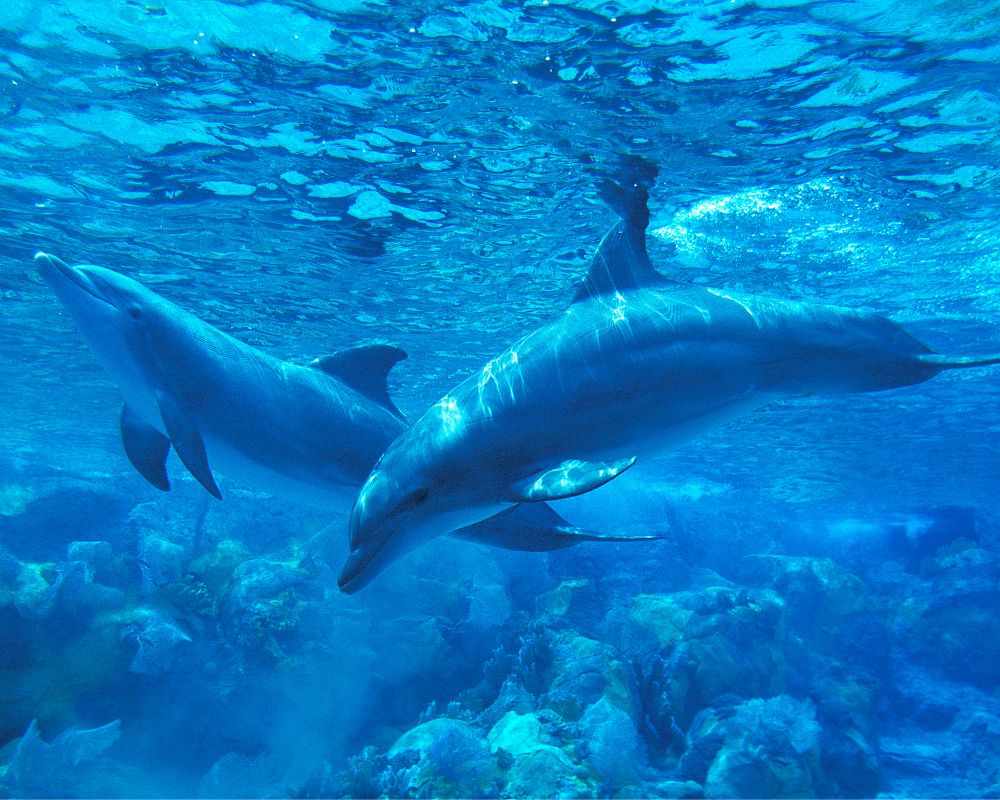Have you ever been out fishing and caught a big, beautiful grouper, only to wonder if it’s something that dolphins might eat? It’s a fascinating question that marine enthusiasts and researchers have been debating for years.
In this blog post, we’ll explore the question of whether dolphins eat grouper. We’ll examine the evidence from scientific studies, discuss the factors that influence dolphin feeding habits, and gain a deeper understanding of the complex interactions that occur in marine ecosystems.
Do Dolphins Eat Grouper?

The answer is yes, dolphins have been known to eat grouper. However, the frequency of this behavior is a subject of debate among researchers.
The question of whether dolphins eat grouper has long been a topic of debate among marine researchers. Some scientists argue that dolphins actively prey on grouper, while others maintain that it’s a rare occurrence.
Scientific Studies And Research
Numerous scientific studies have been conducted to investigate this question. A study in the Bahamas found that dolphins actively targeted and ate Nassau grouper, a species that is often overfished by humans. Similarly, researchers in the Florida Keys observed dolphins preying on red grouper.
However, other studies suggest that dolphin-grouper interactions may not be as common as previously thought. A study in the Bahamas found that dolphins only consumed grouper in 0.7% of their feeding events. This low frequency of grouper consumption led researchers to conclude that it’s not a significant part of the dolphin diet.
Feeding Habits And Influencing Factors
So, why the discrepancy? One possible explanation is that dolphin feeding habits can vary depending on their location, available prey, and individual preferences. Some populations of dolphins may have a higher incidence of grouper consumption, while others may not eat grouper at all.
Another factor to consider is the seasonality of grouper spawning. Grouper typically spawn during the winter months, which may make them more vulnerable to predation by dolphins during this time.
Overall, while the evidence suggests that dolphins do eat grouper, the frequency of this behavior is still a topic of debate among researchers. Nevertheless, it’s clear that dolphins have a diverse diet and will consume a variety of fish species depending on their habitat and available prey.
So, if you’re out fishing and catching a grouper, don’t worry too much about dolphins stealing your catch. While it’s possible, it’s not a common occurrence.
Why Do Dolphins Eat Grouper?
Now that we know that dolphins do, in fact, eat grouper, the next question is why? What makes this particular fish so appealing to these intelligent marine mammals?
One reason dolphins may choose to eat grouper is because of its high nutritional value. Grouper is a large, meaty fish that contains a lot of protein and other essential nutrients that dolphins need to survive.[1]
Another reason why dolphins may eat grouper is because of its role in the marine food web. Grouper is a predatory fish that feeds on smaller fish and crustaceans and is an important part of many coastal ecosystems. By eating grouper, dolphins may be helping to control the populations of smaller fish and maintain a healthy balance in the ecosystem.
Finally, eating grouper may simply be a matter of taste and convenience for dolphins. Grouper can be found in many different habitats and is often easy for dolphins to catch, making it a convenient food source. Additionally, the energy and essential nutrients provided by grouper may help dolphins to maintain their health and well-being.
Grouper’s Defense Mechanisms Against Dolphins
Have you ever wondered why dolphins might have a hard time catching grouper? Well, it turns out that these fish have some unique features that make them difficult prey. Let’s take a look at some of their defense mechanisms.
Camouflage
Grouper are masters of disguise! They have the ability to change their skin color and patterns to match their surroundings. This makes them blend in with their environment and harder for dolphins to spot them.
Size
Another factor that makes grouper difficult prey for dolphins is their size. Some species of grouper can grow up to six feet long and weigh over 1,000 pounds! That’s a lot of fish to swallow, even for a dolphin.
Behavior
Groupers are also very smart when it comes to avoiding predators. They tend to stay hidden in rocky crevices or other areas where dolphins can’t easily reach them. They also have a tendency to swim near the bottom of the ocean, which makes it harder for dolphins to catch them.
Fins And Other Body Parts
Lastly, groupers have some pretty impressive fins and other body parts that they can use to escape from dolphins. For example, some species of grouper have spines on their dorsal fins that they can raise up to defend themselves. Others have sharp teeth and powerful jaws that they can use to bite back.
All of these defense mechanisms combined make grouper a challenging prey for dolphins. However, this doesn’t mean that dolphins never eat grouper. In fact, some species of dolphins have been known to develop specialized hunting techniques to catch these fish.
Why Dolphins Might Not Eat Grouper
It’s understandable to assume that dolphins would readily hunt and eat grouper, given their diet of fish and other sea creatures. However, there are several reasons why dolphins might not include grouper in their menu.
Firstly, the availability of other food sources in their habitat plays a significant role. Dolphins are opportunistic predators and tend to feed on whatever is abundant and easily accessible. In some areas, where grouper populations are low or not present, dolphins may simply not have the opportunity to hunt them.
Secondly, the risks involved in hunting grouper may also deter dolphins from pursuing them. Groupers have a range of defense mechanisms, including their size, camouflage, and behavior, that make them challenging prey for dolphins. Additionally, groupers have sharp fins and spines that can cause injuries to predators, such as dolphins, during an attack.
Lastly, human activities such as overfishing and habitat destruction can also impact the availability of grouper and other prey species for dolphins. The decline in grouper populations due to overfishing can make it even harder for dolphins to access them as a food source.
Conclusion
In conclusion, while the debate on whether dolphins eat grouper or not is ongoing, scientific studies have provided evidence that they do occasionally prey on them.
Grouper, with their high nutritional value, play a vital role in the marine food web and are a potential food source for many predators, including dolphins.
However, groupers have unique defense mechanisms, such as their size, behavior, and camouflage, that make them difficult prey for dolphins.
It’s also important to note that the availability of other food sources and the risks involved in hunting grouper may impact why dolphins might not eat grouper. Additionally, human activities such as overfishing can disrupt the diet of dolphins and their interaction with grouper.

